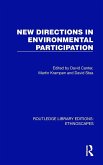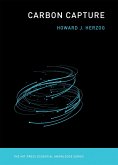100 Key Concepts in Environmental Psychology
Herausgegeben:Marchand, Dorothée; Weiss, Karine; Pol, Enric
100 Key Concepts in Environmental Psychology
Herausgegeben:Marchand, Dorothée; Weiss, Karine; Pol, Enric
- Broschiertes Buch
- Merkliste
- Auf die Merkliste
- Bewerten Bewerten
- Teilen
- Produkt teilen
- Produkterinnerung
- Produkterinnerung
This accessible book defines 100 key concepts, ideas and processes in Environmental Psychology to provide an introductory reference work that brings together research and theory in a bite-size format.
With contributions from leading figures within Environmental Psychology, each concept is clearly defined and explained within the context of issues around the environment, sustainability, climate change, nature and architecture. This book considers the involvement of psychological, physiological and social processes to understand the mechanisms that explain and contribute to the evolution of…mehr
Andere Kunden interessierten sich auch für
![Environmental and Architectural Psychology Environmental and Architectural Psychology]() Ian DonaldEnvironmental and Architectural Psychology143,99 €
Ian DonaldEnvironmental and Architectural Psychology143,99 €![Environmental and Architectural Psychology Environmental and Architectural Psychology]() Ian DonaldEnvironmental and Architectural Psychology21,99 €
Ian DonaldEnvironmental and Architectural Psychology21,99 €![Environmental Policy, Assessment and Communication Environmental Policy, Assessment and Communication]() Environmental Policy, Assessment and Communication115,99 €
Environmental Policy, Assessment and Communication115,99 €![New Directions in Environmental Participation New Directions in Environmental Participation]() New Directions in Environmental Participation99,99 €
New Directions in Environmental Participation99,99 €![Carbon Capture Carbon Capture]() Howard J. Herzog (Massachusetts Institute Senior Research EngineerCarbon Capture12,99 €
Howard J. Herzog (Massachusetts Institute Senior Research EngineerCarbon Capture12,99 €![The Climate Action Handbook The Climate Action Handbook]() Heidi RoopThe Climate Action Handbook17,99 €
Heidi RoopThe Climate Action Handbook17,99 €![Climate Crisis, Psychoanalysis, and Radical Ethics Climate Crisis, Psychoanalysis, and Radical Ethics]() Donna M. OrangeClimate Crisis, Psychoanalysis, and Radical Ethics154,99 €
Donna M. OrangeClimate Crisis, Psychoanalysis, and Radical Ethics154,99 €-
-
-
This accessible book defines 100 key concepts, ideas and processes in Environmental Psychology to provide an introductory reference work that brings together research and theory in a bite-size format.
With contributions from leading figures within Environmental Psychology, each concept is clearly defined and explained within the context of issues around the environment, sustainability, climate change, nature and architecture. This book considers the involvement of psychological, physiological and social processes to understand the mechanisms that explain and contribute to the evolution of behavior and attitudes that relate to our relationship with the environment. Concepts covered include biodiversity, eco-anxiety, place identity, sustainable behaviour, climate justice and environmental attitudes.
By integrating ideas from different disciplinary orientations in the field of Environmental Psychology, this book allows for a better understanding of the processes related to the individual-environment relationship, as well as the applications that they allow for in various fields of intervention. This is essential reading for students and researchers in Environmental Psychology, Sustainability Studies, Architecture and Built Environment Studies and related fields.
With contributions from leading figures within Environmental Psychology, each concept is clearly defined and explained within the context of issues around the environment, sustainability, climate change, nature and architecture. This book considers the involvement of psychological, physiological and social processes to understand the mechanisms that explain and contribute to the evolution of behavior and attitudes that relate to our relationship with the environment. Concepts covered include biodiversity, eco-anxiety, place identity, sustainable behaviour, climate justice and environmental attitudes.
By integrating ideas from different disciplinary orientations in the field of Environmental Psychology, this book allows for a better understanding of the processes related to the individual-environment relationship, as well as the applications that they allow for in various fields of intervention. This is essential reading for students and researchers in Environmental Psychology, Sustainability Studies, Architecture and Built Environment Studies and related fields.
Produktdetails
- Produktdetails
- Verlag: Routledge / Taylor & Francis
- Seitenzahl: 234
- Erscheinungstermin: 27. Juni 2023
- Englisch
- Abmessung: 234mm x 156mm x 13mm
- Gewicht: 453g
- ISBN-13: 9781032466965
- ISBN-10: 1032466960
- Artikelnr.: 67515135
- Herstellerkennzeichnung
- Libri GmbH
- Europaallee 1
- 36244 Bad Hersfeld
- gpsr@libri.de
- Verlag: Routledge / Taylor & Francis
- Seitenzahl: 234
- Erscheinungstermin: 27. Juni 2023
- Englisch
- Abmessung: 234mm x 156mm x 13mm
- Gewicht: 453g
- ISBN-13: 9781032466965
- ISBN-10: 1032466960
- Artikelnr.: 67515135
- Herstellerkennzeichnung
- Libri GmbH
- Europaallee 1
- 36244 Bad Hersfeld
- gpsr@libri.de
Dorothée Marchand is a researcher in social and environmental psychology at CSTB (Scientific and Technical Centre for Building, France). She works on well-being, resilience, quality of life and urban quality. Enric Pol is a professor of Social and Environmental Psychology at the University of Barcelona (Spain). Director of the Research Group in Social, Environmental and Organizational Psychology (PsicoSAO), he is the founder of the Masters in Environmental Intervention and Management, Person and Society. Karine Weiss is a Professor of Social and Environmental Psychology at the University of Nîmes (France). She is responsible for the Masters in Social and Environmental Psychology. She works on risk prevention and adaptation to climate change.
1. Acceptability - Susana Batel 2. Affordances - Harry Heft 3. Aggression - Elena Sautkina 4. Ambiance - Jean-Paul Thibaud 5. (Socio-spatial) Anchoring - Pierre Dias 6. Annoyance - Dorothée Marchand 7. Architectural Psychology - David Canter 8. Attention Restoration Theory - William C. Sullivan & Rachel Kaplan 9. Behavior and practice - Raquel Bertoldo 10. Behavior setting - Sandrine Depeau & Karine Weiss 11. Biodiversity - Marie Feliot-Rippeault 12. Climate change - Raquel Bertoldo 13. Climate justice - Ana M. Mártin & Bernardo Hernández 14. Comfort and discomfort - Dorothée Marchand 15. Commented city walks - Jean-Paul Thibaud 16. Commitment (theory of) - Fabien Girandola 17. Congruence - Karine Weiss 18. Connection with nature - Oscar Navarro 19. Conservation (the psychology of conservation) - Susan Clayton 20. Crisis - Dimitri Lapierre & Clément Laverdet 21. Crowding - Gary W. Evans & Kalee DeFrance 22. Cultural theory - Céline Kermisch 23. Eco-anxiety - Karine Weiss 24. Ecocentrism - José A. Corraliza & Silvia Collado 25. Eco-district - Tomeu Vidal 26. Eco-fatigue (Green-fatigue) - Enric Pol & Dorothée Marchand 27. Ecological model in environmental psychology - Sandrine Depeau 28. Ecological psychology, the German heritage - Lenelis Kruse 29. Ecology - Alexandra Schleyer-Lindenmann & Karine Weiss 30. Ecosystem - Karine Weiss 31. Environment - Mirilia Bonnes 32. Environmental attitudes - Florian G. Kaiser & Inga Wittenberg 33. Environmental communication - Angela Castrechini 34. Environmental education - Claudio D. Rosa & Silvia Collado 35. Environmental health - Ghozlane Fleury-Bahi 36. Environmental inequality - Cyria Emelianoff 37. Environmental justice - Bernardo Hernández & Ana M. Mártin 38. Environmental management - Isabel Pellicer-Cardona 39. Environmental Psychology - Enric Pol 40. Environmental quality - Ferdinando Fornara 41. Feedback - Béatrice Gisclard 42. Goal-framing theory - Siegwart Lindenberg 43. Home (chez-soi) - Perla Serfaty-Garzon 44. Hospitality - Perla Serfaty-Garzon 45. Housing - Perla Serfaty-Garzon 46. Landscape/ Landscape quality - Maria Luisa Lima 47. Learned Helplessness and the environment - Enric Pol 48. Legibility - Thierry Ramadier 49. Memory of places - Denise Jodelet 50. Ménagement - Emeline Bailly 51. Mobility - Sandrine Depeau 52. Nature, a psychological perspective - Henk Staats 53. New Ecological Paradigm (NEP) - Karine Weiss 54. NIMBY - Patrick Devine-Wright 55. Norms - Wesley Schultz 56. Nudge - Christophe Demarque 57. Nuisance - Dorothée Marchand 58. Perception - Dorothée Marchand & Enric Pol 59. Place - Mirilia Bonnes 60. Place appropriation - Andrés Di Masso 61. Place attachment - Karine Weiss 62. Place identity - Marino Bonaiuto & Valeria Chiozza 63. Psychological Distance (theory of) - Oscar Navarro 64. Quality of life - Giuseppe Carrus, Angela Castrechini, Enric Pol 65. Renaturation - Isabelle Richard 66. Residential discrimination - Ghozlane Fleury-Bahi & André Ndobo 67. Residential satisfaction - Marino Bonaiuto & Valeria Chiozza 68. Resilience - Ricardo García Mira 69. (Revitalizing) Interlinkings - Chris Younès 70. Risk - Karine Weiss & Marie Boss 71. Sick building syndrome - Dorothée Marchand 72. Social dilemma - Robert Gifford 73. Social Ecology - Daniel Stokols 74. Social representations of the environment - Patrick Rateau 75. Socio-spatial categorization - Pierre Dias 76. Socio-spatial representations - Denise Jodelet 77. Solastalgia - Dorothée Marchand 78. Space - Space Psychology - Bernardo Jiménez-Domínguez & Rosa M. López Aguilar 79. Spatial cognition - Thierry Ramadier 80. Spatial meaning - Kevin Clementi 81. Stress - Gary W. Evans & Kalee DeFrance 82. Stress Reduction Theory - Roger S. Ulrich 83. Sustainable behavior - Víctor Corral-Verdugo 84. Sustainable city - Tomeu Vidal 85. Sustainable development - Karine Weiss 86. Territory, territorialities - Marie-Line Félonneau 87. Therapeutic environments - Kevin Charras 88. Threat - Sofia Payotte & Sabine Caillaud 89. Time perspective - Christophe Demarque 90. Topological identity - Marie-Line Félonneau 91. Topophilia - Cristina Garcia Fontan 92. Umwelt - Hartmut Günther 93. Uncertainty - Dorothée Marchand 94. Urban crime - Elena Sautkina 95. Urban design - Dorothée Marchand 96. Values - Godda Perlaviciute & Thijs Bouman 97. Vulnerability - Oscar Navarro 98. Walkability - Julie Roussel 99. Wayfinding - Sergi Valera 100. Well-being - Barbara Bonnefoy 101. Work environment - Eva Moffat
1. Acceptability - Susana Batel 2. Affordances - Harry Heft 3. Aggression - Elena Sautkina 4. Ambiance - Jean-Paul Thibaud 5. (Socio-spatial) Anchoring - Pierre Dias 6. Annoyance - Dorothée Marchand 7. Architectural Psychology - David Canter 8. Attention Restoration Theory - William C. Sullivan & Rachel Kaplan 9. Behavior and practice - Raquel Bertoldo 10. Behavior setting - Sandrine Depeau & Karine Weiss 11. Biodiversity - Marie Feliot-Rippeault 12. Climate change - Raquel Bertoldo 13. Climate justice - Ana M. Mártin & Bernardo Hernández 14. Comfort and discomfort - Dorothée Marchand 15. Commented city walks - Jean-Paul Thibaud 16. Commitment (theory of) - Fabien Girandola 17. Congruence - Karine Weiss 18. Connection with nature - Oscar Navarro 19. Conservation (the psychology of conservation) - Susan Clayton 20. Crisis - Dimitri Lapierre & Clément Laverdet 21. Crowding - Gary W. Evans & Kalee DeFrance 22. Cultural theory - Céline Kermisch 23. Eco-anxiety - Karine Weiss 24. Ecocentrism - José A. Corraliza & Silvia Collado 25. Eco-district - Tomeu Vidal 26. Eco-fatigue (Green-fatigue) - Enric Pol & Dorothée Marchand 27. Ecological model in environmental psychology - Sandrine Depeau 28. Ecological psychology, the German heritage - Lenelis Kruse 29. Ecology - Alexandra Schleyer-Lindenmann & Karine Weiss 30. Ecosystem - Karine Weiss 31. Environment - Mirilia Bonnes 32. Environmental attitudes - Florian G. Kaiser & Inga Wittenberg 33. Environmental communication - Angela Castrechini 34. Environmental education - Claudio D. Rosa & Silvia Collado 35. Environmental health - Ghozlane Fleury-Bahi 36. Environmental inequality - Cyria Emelianoff 37. Environmental justice - Bernardo Hernández & Ana M. Mártin 38. Environmental management - Isabel Pellicer-Cardona 39. Environmental Psychology - Enric Pol 40. Environmental quality - Ferdinando Fornara 41. Feedback - Béatrice Gisclard 42. Goal-framing theory - Siegwart Lindenberg 43. Home (chez-soi) - Perla Serfaty-Garzon 44. Hospitality - Perla Serfaty-Garzon 45. Housing - Perla Serfaty-Garzon 46. Landscape/ Landscape quality - Maria Luisa Lima 47. Learned Helplessness and the environment - Enric Pol 48. Legibility - Thierry Ramadier 49. Memory of places - Denise Jodelet 50. Ménagement - Emeline Bailly 51. Mobility - Sandrine Depeau 52. Nature, a psychological perspective - Henk Staats 53. New Ecological Paradigm (NEP) - Karine Weiss 54. NIMBY - Patrick Devine-Wright 55. Norms - Wesley Schultz 56. Nudge - Christophe Demarque 57. Nuisance - Dorothée Marchand 58. Perception - Dorothée Marchand & Enric Pol 59. Place - Mirilia Bonnes 60. Place appropriation - Andrés Di Masso 61. Place attachment - Karine Weiss 62. Place identity - Marino Bonaiuto & Valeria Chiozza 63. Psychological Distance (theory of) - Oscar Navarro 64. Quality of life - Giuseppe Carrus, Angela Castrechini, Enric Pol 65. Renaturation - Isabelle Richard 66. Residential discrimination - Ghozlane Fleury-Bahi & André Ndobo 67. Residential satisfaction - Marino Bonaiuto & Valeria Chiozza 68. Resilience - Ricardo García Mira 69. (Revitalizing) Interlinkings - Chris Younès 70. Risk - Karine Weiss & Marie Boss 71. Sick building syndrome - Dorothée Marchand 72. Social dilemma - Robert Gifford 73. Social Ecology - Daniel Stokols 74. Social representations of the environment - Patrick Rateau 75. Socio-spatial categorization - Pierre Dias 76. Socio-spatial representations - Denise Jodelet 77. Solastalgia - Dorothée Marchand 78. Space - Space Psychology - Bernardo Jiménez-Domínguez & Rosa M. López Aguilar 79. Spatial cognition - Thierry Ramadier 80. Spatial meaning - Kevin Clementi 81. Stress - Gary W. Evans & Kalee DeFrance 82. Stress Reduction Theory - Roger S. Ulrich 83. Sustainable behavior - Víctor Corral-Verdugo 84. Sustainable city - Tomeu Vidal 85. Sustainable development - Karine Weiss 86. Territory, territorialities - Marie-Line Félonneau 87. Therapeutic environments - Kevin Charras 88. Threat - Sofia Payotte & Sabine Caillaud 89. Time perspective - Christophe Demarque 90. Topological identity - Marie-Line Félonneau 91. Topophilia - Cristina Garcia Fontan 92. Umwelt - Hartmut Günther 93. Uncertainty - Dorothée Marchand 94. Urban crime - Elena Sautkina 95. Urban design - Dorothée Marchand 96. Values - Godda Perlaviciute & Thijs Bouman 97. Vulnerability - Oscar Navarro 98. Walkability - Julie Roussel 99. Wayfinding - Sergi Valera 100. Well-being - Barbara Bonnefoy 101. Work environment - Eva Moffat








